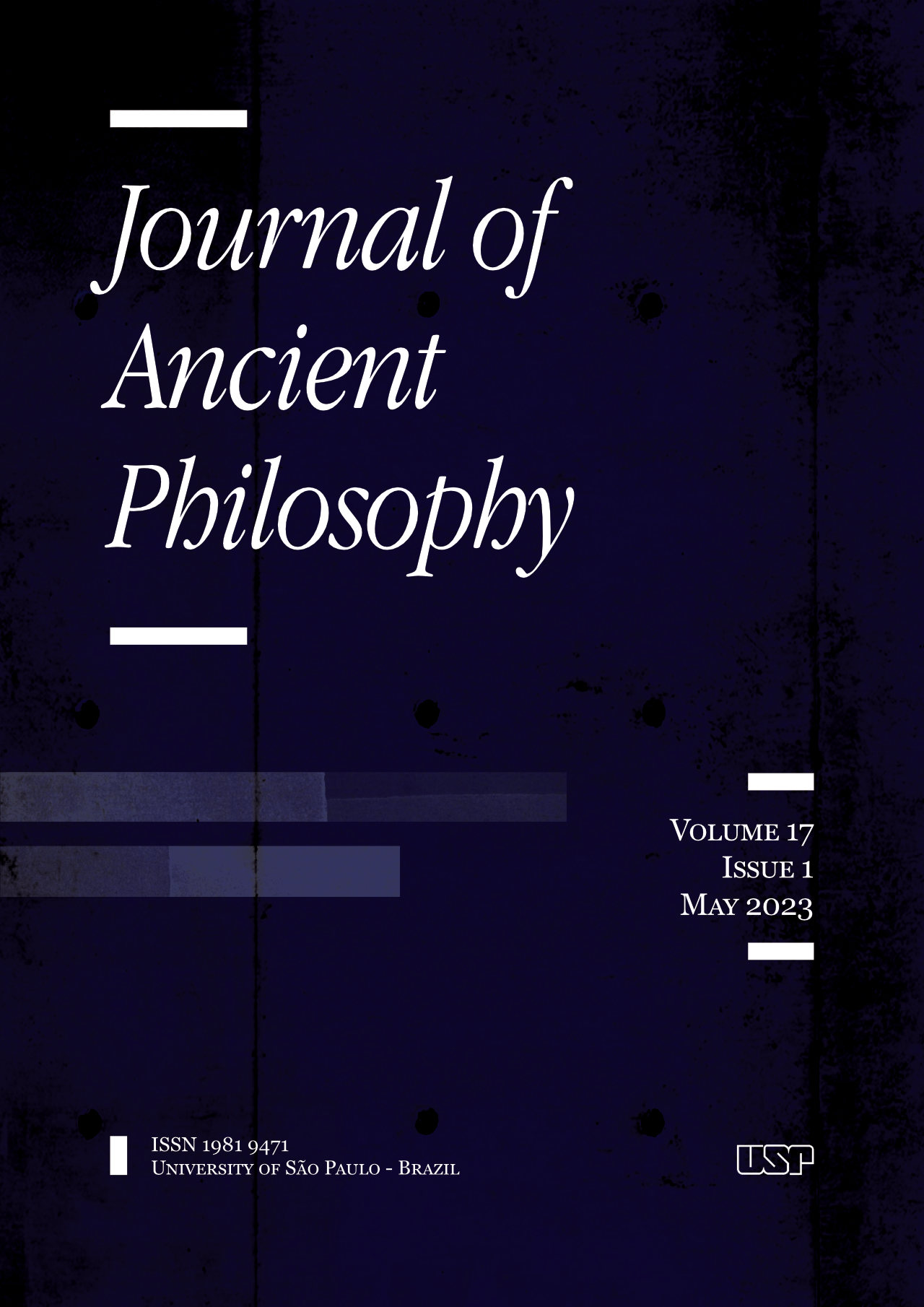A Note on Aristotle’s De Anima Α 1, 403a10-16
DOI:
https://doi.org/10.11606/issn.1981-9471.v17i1p139-146Palavras-chave:
Aristotle, separation, geometrical objects, soulResumo
In this paper I discuss passage 403a10-16 from Aristotle’s De Anima. In this passage Aristotle deals with whether the soul could be separate from the body and presents an analogy with geometrical entities. This passage is highly obscure and it presents many textual difficulties. The interpretation I offer resolves the textual problems without requiring emendations to the text as many commentators suggest.
Downloads
Referências
Aquinas, Thomas. Opera Omnia iussu Leonis XIII P.M. edita, 45/1: Sentencia libri de anima, ed. Dominicans. Rome: Comissio Leonina; Paris: J. Vrin, 1984.
Bostock, David. “Aristotle’s Philosophy of Mathematics”, in Shields, Christopher (ed.), The Oxford Handbook of Aristotle, Oxford University Press, Oxford, 2012 (465-491).
Hamlyn. Aristotle De Anima, Books I and II (with passages from book I), Clarendon Press, Oxford, 1968.
Hicks, R. D. Aristotle De Anima: With Translation, Introduction and Notes, Cambridge University Press, 1907.
Katz, Emily. “Geometrical Objects as Properties of Sensibles: Aristotle’s Philosophy of Geometry”, Phronesis, 64, 2019 (465-513).
Lear, Jonathan. “Mathematics in Aristotle” Philosophical Review, XCI, 1982 (161-192).
McKay, Robert. “Touching the bronze sphere at a point: a note on De Anima I. 1, 403a10 – 16, Apeiron, Vol. XIII, 1979 (86-90).
Mueller, Ian. “Aristotle on Geometrical Objects” (Archiv für Geschichte der Philosophie 52, 1970 (156-171), repr. in J. Barnes et al., (eds.), Articles on Aristotle vol.3, Duckworth, London, 1979 (96-107).
Pettigrew, R. ‘Aristotle on the Subject Matter of Geometry’, Phronesis, 54 (3), 2009, (239-260).
Philoponus, Johanes. Commentaria in Aristoteliam Greca, vol. XV, Philoponi in Aristotelis De Anima, Typis et Impensis Georgii Reimeri, Berlin, 1908.
Polansky, Roland. Aristotle’s De Anima, Cambridge University Press, Cambridge, 2007.
Ross, W. H. Aristotle De Anima, Oxford University Press, Oxford, 1961.
Downloads
Publicado
Edição
Seção
Licença
Copyright (c) 2023 Orestis Karasmanis

Este trabalho está licenciado sob uma licença Creative Commons Attribution-NonCommercial 4.0 International License.
Autores que publicam nesta revista concordam com os seguintes termos:- Autores mantém os direitos autorais e concedem à revista o direito de primeira publicação, com o trabalho simultaneamente licenciado sob a Licença Creative Commons Attribution (CC 4.0) que permite o compartilhamento do trabalho com reconhecimento da autoria e publicação inicial nesta revista.
- Autores têm autorização para assumir contratos adicionais separadamente, para distribuição não-exclusiva da versão do trabalho publicada nesta revista (ex.: publicar em repositório institucional ou como capítulo de livro), com reconhecimento de autoria e publicação inicial nesta revista.
- Autores têm permissão e são estimulados a publicar e distribuir seu trabalho online (ex.: em repositórios institucionais ou na sua página pessoal) a qualquer ponto antes ou durante o processo editorial, já que isso pode gerar alterações produtivas, bem como aumentar o impacto e a citação do trabalho publicado (Veja O Efeito do Acesso Livre).


